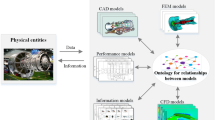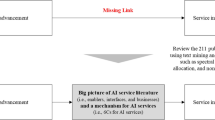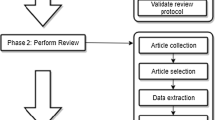Abstract
In service engineering, a service is represented as a functional structure that satisfies customer requirements. Specific entities and their activities are associated with a functional structure as a way to accomplish a goal. In this phase, it is important for service designers to have broad knowledge, since entities that construct a service include both human and physical products. Therefore, the extent of the designer’s knowledge is the key to the enhancement of design solutions. However, few tools to support designers in the embodiment phase have been proposed. In this paper, for the purpose of constructing a function embodiment knowledge base in service design, the representational form of knowledge is proposed, and a prototype system of function embodiment knowledge base is established. Then function embodiment knowledge is collected from multiple service cases using the prototype system, and the effectiveness of knowledge base is discussed.
Similar content being viewed by others
References
Tukker A, Tischner U. Product-services as a research filed: past, present, and future. Reflections from a decade of research. J Clean Product, 2006, 14: 1552–1556
McAloone T C, Andreason M M. Design for utility, sustainability and social virtues, developing product service systems. In: Proceedings of the 8th International Design Conference, Dubrovnik, 2004. 1545–1552.
Shimomura Y, Tomiyama T. Service modelling for service engineering. In: Proceedings of the 5th International Conference on Design of Information Infrastructure Systems for Manufacturing, Osaka, 2002. 309–316
Hara T, Arai T, Shimomura Y. A CAD system for service innovation: integrated representation of function, service activity, and product behavior. J Engin Des, Special issue on PSS, 2009, 20: 367–388
Yoshikawa H, Tomiyama T. Design Theory (in Japanese). Chiba: The Open University of Japan, 2000
Pahl G, Beitz W. Engineering Design: A Systematic Approach. Berlin: Springer-Verlag, 1988
Umeda Y, Ishii M, Yoshikawa M, et al. Supporting conceptual design based on the function-behavior-state modeler. Artif Intell Eng Des, Anal Manuf, 1996, 10: 275–288
Shostack G L. How to design a service. Eur J Mark, 1982, 16: 49–63
Lovelock C H, Wright L. Principles of Service Marketing and Management. New Jersey: Prentice-Hall, 1999
Yoshikawa H. Introduction to service engineering. Synthes English Edit, 2008, 1: 103–113
Lossack R S, Yoshioka M, Umeda Y, et al. Requirement, function and physical principle modelling as the basis for a model of synthesis. In: Proceedings of the 1998 Lancaster International Workshop on Engineering Design, Lancaster, 1998. 165–179
Hirtz J, Stone R B, McAdams D A, et al. A functional basis for engineering design: reconciling and evolving previous efforts. Res Eng Des, 2002, 13: 65–82
Ito K, Komatsubara A, Kuwano S. Human Engineering Handbook (in Japanese). Asakura Shoten, 2003
Eclipse org. http://www.eclipse.org
Service Productivity & Innovation for Growth (in Japanese). http://www.service-js.jp/cms/page0600.php
Baxter D, Roy R, Doultsinou N, et al. A knowledge management framework to support product-service system design. Int J Comput Integr Manuf, 2009, 22: 1073–1088
Annamalai G, Hussain R, Cakkoi M, et al. An ontology for product-service system. In: Proceedings of the 3rd CIRP International Conference on Industrial Product-Service Systems, Braunschweig, 2011. 231–236
Takeda H. Semantic Web: A road to the knowledge infrastructure on the Internet. New Gener Comput, 2004, 22: 395–413
Takahashi K, Sugiyama A, Shimomura Y, et al. Web-based knowledge database construction method for supporting design. In: Proceedings of the 10th International Conference on Information Integration and Web-based Applications and Services, Linz, 2008. 575–578
Author information
Authors and Affiliations
Corresponding author
Rights and permissions
About this article
Cite this article
Nemoto, Y., Akasaka, F., Chiba, R. et al. Establishment of a function embodiment knowledge base for supporting service design. Sci. China Inf. Sci. 55, 1008–1018 (2012). https://doi.org/10.1007/s11432-012-4561-3
Received:
Accepted:
Published:
Issue Date:
DOI: https://doi.org/10.1007/s11432-012-4561-3




